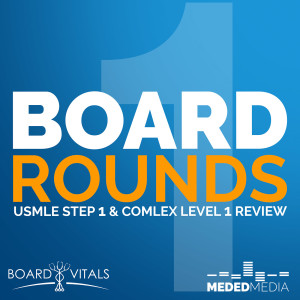
12: USMLE and COMLEX Prep: 65 y/o Female with a GI Bleed
 2019-04-10
2019-04-10
Today, we have a question regarding a 65 y/o patient with a GI bleed. Our job is to find where in the GI tract she is most susceptible to ischemia
We're joined once again by Dr. Andrea Paul from Board Vitals. If you're looking for a QBank to help you with your Step 1 or Level 1, check them out. Use the promo code BOARDROUNDS to save 15%. You may also sign up for a free trial to get a feel of what their platform is all about. They have over 1,750 questions for Step 1 and over 1,500 questions for Level 1 – enough to help make sure you have the knowledge necessary to get the best score possible.
[02:55] Question of the WeekA 65-year-old female develops abdominal pain, bloody diarrhea 24 hours after undergoing hemicolectomy for recurrent diverticulitis. Her surgery was complicated by hypotension, blood pressure down to 70/50, treated, and her medical history is remarkable for diverticulitis, hypertension, dyslipidemia, coronary artery disease, no other episodes of any GI bleeding in the past. Her last colonoscopy was normal four years ago. The patient's current condition most likely involves pathology affecting which of the following portions of the intestine?
(A) Cecum
(B) Splenic flexure
(C) Ascending colon
(D) Transverse colon
(E) Hepatic flexure
[04:25] Understanding the QuestionThe key here is that the patient underwent hemicolectomy for diverticulitis which led to hypotension. So there was some interop issue. And reading her problem list, she's got a coronary vascular disease. She's prone to having some sort of ischemia somewhere.
But first, we need to understand what is being asked for. So here, they're asking where along the chain of the GI tract is someone most vulnerable to ischemia.
"Read the question first so you have that in mind when you're reading the whole case."
[06:35] Thought Process in Answering the QuestionThe arterial supply to the intestine is pretty complicated and not really something that makes sense intuitively. What you need to remember here is that for most of the blood supply is from the superior mesenteric artery as well as the inferior mesenteric artery. Then there's a lot of collateral blood supply too and this great. But there are some couple of areas that are particularly prone to ischemia, even a brief hypotensive episode and someone who's vulnerable like this patient. Those are sometimes called watershed areas. They're in between those major vessels and there are not a lot of collateral supply. The two most common places this happens are the splenic flexure and the rectus sigmoid junction. This is because the large vessels are compromised. There is no adequate collateral blood flow specifically in those two places. Hence, the correct answer here is B.
[08:30] Understanding the Other ChoicesThe cecum is supplied by the branches right off the superior mesenteric. It's not particularly prone. The same with ascending colon. Transverse colon receives its blood supply from the middle colic artery, which is a branch of the superior mesenteric. Hepatic flexure is also supplied by that large vessel.
[09:30] Some Studying TipsAgain, the key to this was the hypotension interop. Andrea says that if you've done a few hundred GI questions, you will see something about hypotension and ischemic colitis somewhere in your readings. If you haven't, the key is looking at the word "current." So it's trying to indicate not what they came in for but it's their current problem. So this could help you rethink and realize that they're not asking for diverticulitis but what happened.
Ultimately, you have to make sure you understand what you're reading. A lot of the questions may not be a post-operative situation. It could just be a question about a patient coming in with bloody diarrhea, the most common sign, along with severe abdominal pain. So when you see bloody diarrhea and severe pain, then you can right away think that it's ischemic. Also see the history of coronary heart disease, diabetes, and all those things that go along to decrease blood flow.
Links:Board Vitals (Use the promo code BOARDROUNDS to save 15%.)
More Episodes
 2020-04-15
2020-04-15
 2020-01-15
2020-01-15
 2019-11-06
2019-11-06
Create your
podcast in
minutes
- Full-featured podcast site
- Unlimited storage and bandwidth
- Comprehensive podcast stats
- Distribute to Apple Podcasts, Spotify, and more
- Make money with your podcast
It is Free
- Privacy Policy
- Cookie Policy
- Terms of Use
- Consent Preferences
- Copyright © 2015-2024 Podbean.com




